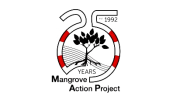
ONLINE RESOURCES
“Integrated protection of mangrove diversity and fragile ecosystems in West Africa and their enhanced resilience to climate change” in 9 West African countries. This is the objective of this project signed in July 2019 with funding from the European Union and implemented jointly by IUCN, Wetlands International Africa and the 5Deltas collective.
Strengthen the actors in the management of protected areas and unprotected mangrove sites. The aim is to link governance and production systems with mangrove conservation structures at the territorial level. These links will be created through exchanges between actors at the level of decision-making on the use of spaces and best practices, to set up or strengthen platforms for dialogue within the landscapes and to make available grants to support management and conservation actions, on the basis of competitive calls for proposals.
Three results are expected:
1. Socio-economic and sectoral activities in the landscapes are coordinated in an integrated manner.
2. Effective management systems for protected areas are developed and operational.
3. Riparian populations derive sustainable benefits from PAs and are more resilient to climate change.
> To know more : PAPBIO website
The Global Mangrove Alliance offers a knowledge hub on mangroves. The hub provides general educational content on mangroves as well as details of projects making an impact around the world. It also publishes the types of resources that help communities, governments, policy-makers, the private sector and non-governmental organisations take action and support proven approaches that restore and protect mangroves.
The Sustainable Wetlands Adaptation and Mitigation Program (SWAMP) aims to generate knowledge useful to decision-makers and practitioners on the sustainable management of wetlands in the face of global climate change and local community livelihoods, based on sound scientific approaches and methodologies. It is a collaboration between the Center for International Forestry Research (CIFOR), the USDA Forest Service (USFS) and Oregon State University, with support from the United States Agency for International Development (USAID). The SWAMP grew out of a multi-stakeholder exercise called the Tropical Wetlands Initiative for Climate Adaptation and Mitigation (TWINCAM).
The Tropical Wetlands Resource Centre is a wetlands resource centre dedicated to overseas wetlands and mangroves. The centre’s work focuses on three main priorities:
– Nation-wide circulation of reliable information about wetlands; action includes news monitoring, newsletter circulation and the publication of documents aimed at professionals and the general public.
– Promotion of best management and restoration practices within the network.
– Coordination for the promotion of World Wetlands Day.
The Tropical Wetlands Resource Centre has also translated into French a book by the Mangrove Action Project on reef restoration and has a database of other wetlands-related publications.
A website offering targeted search tools helping you find bibliographies, case studies or innovative techniques. It is run by the French Biodiversity Agency (AFB) and managed by French public and private partners (the Water and Biodiversity Department of the Ministry of Ecology (MTES), the National Federation of Public Works, the Union of Ecological Engineering Professionals and the Federation of Ecological Engineering and Engineering Actors).
One of the actions under France’s initiative to safeguard coral reefs and their associated ecosystems (IFRECOR), which is headed by Sylvain Pioch, is to develop a theoretical method for measuring compensatory mitigation in coral areas. The method, known as MERCI-Cor (Method to avoid, reduce and offset impacts in coral areas), involves evaluating the ecological gains and losses caused by development projects. This will ensure that such projects comply with the ecological equivalence requirement, i.e. no net loss of biodiversity (MERCI-Cor guide). With this in mind, Aurore Leocadie has just produced a work listing all the methods of repairing coral reefs and their associated ecosystems (available soon on this site).
IUCN’s French Committee is currently developing a series of case studies on nature-based solutions (actions to protect, sustainably manage and restore natural or modified ecosystems in order to manage natural water-related risks while simultaneously contributing towards safeguarding biodiversity) that will demonstrate the role played by ecosystems in the management of natural water-related risk (flooding, drought, erosion, run-off, etc.).This work follows on from IUCN’s previous work to promote nature-based solutions in France: Nature-based solutions.
CRG is an NGO that works with public and private partners to safeguard Florida’s native coastal wetlands. Founded in 2004, it provides scientific and technical expertise in the ecology, restoration and management of mangroves, salt marshes and seagrass beds. CRG biologists have been involved in habitat restoration in the Florida Keys since 1980, carrying out Florida’s largest aquatic plant restoration project and managing the original Keys Restoration Trust Fund in the 1990s.
IUCN International website, mangrove restoration page.
Website featuring nature-based solutions, including mangroves (restoration, etc.).
Mangrove Action Projet is dedicated to combating the degradation and deforestation of mangrove forests around the world. Its main aim is to promote the rights of indigenous coastal people and local populations by involving fishermen and farmers in sustainable coastal management.
The CBEMR method, community-based ecological mangrove restoration
Working with scientists, local NGOs and communities, the MAP (Mangrove Action Project) is a non-profit organisation whose mission is to promote the mangrove restoration method known as CBEMR (Community-Based Ecological Mangrove Restoration). The method was developed after it was found that “traditional” restoration programmes, where mangrove shoots are grown in nurseries and then planted, resulted in too many failures.
> Link to the CBEMR guide
To share its method and discuss and exchange ideas about mangrove restoration projects, the MAP has created a “CBEMR e-group”, which now has more than 200 members (forum in English).
Roy Lewis’s website:
www.mangroverestoration.com
Mapping Ocean Wealth has produced a number of different tools, among them tools for restoring mangroves.
Their website offers a global model and map of mangrove restoration potential, by country, to help practitioners identify priority areas and to support and encourage global mangrove restoration projects developed by TNC and IUCN.
The site also provides a large number of resources.
Created in February 2018 on the model of the collective 5Δ, the collective of the Delta of the Gulf of Benin brings together actors from Togo, Benin, Ghana, Ivory Coast and Nigeria.
> Les Deltas du Monde website
> Website of the collective













